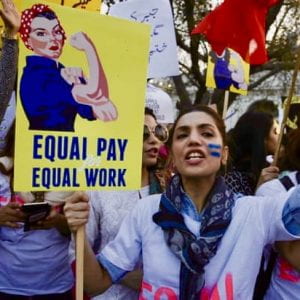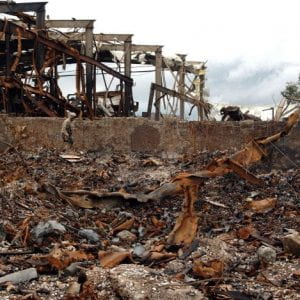Women’s March in Pakistan
In Exit West, Nadia is a woman who defies the gender stereotypes in her country. She lives alone at a time is dangerous for a woman to do so and pays for it. When Nadia decided to move out of her parent’s house, her family cut all contact with her. Moreover, despite always being on guard, she is sexually assaulted on a day she is traveling alone.
Protesters in Lahore, Pakistan are drawing attention to social injustices across in their country. They hope to see a decline in workplace sexual harassment, child marriage, and “honor killings.” They are also seeking a voice in their government through fair voting laws and equal representation of female elected officials.
Sabrina Toppa of The Guardian writes: “The aim is to reach ordinary women in factories, homes, and offices, says Nighat Dad, an aurat march organiser in Lahore. ‘We want an organic movement by women demanding equal access to justice and ending discrimination of all kinds’.”
Read the full story here.
Trump’s Muslim Ban
“Trump has revealed a fundamentally intolerant, racist, aggressive, ignorant strand of America that they believe has always been part of America but has been successfully camouflaged by previous occupants of the Oval Office,” says Mohsin Hamid in a Foreign Policy interview.
When asked if Exit West was inspired by U.S President Donald Trump’s Muslim Ban, novelist Mohsin Hamid responded that he wants to challenge the notion that a government has a fundamental right to control people’s movement.
The article on the National Immigration Law Center outlines the most critical components of Trump’s Muslim Ban. “President Trump signed the first version, Muslim Ban 1.0, on Jan. 27, 2017, and it became effective that day.” The Supreme Court ruled that the third iteration of the ban was constitutional on June 26, 2018. For this, they received criticism for because the ban blatantly targets people based on religion.
Between March 2017 and November 2018, the Muslim ban has slashed the number of admitted refugees and banned asylum seekers from the Southern U.S Border.
Read the full story here.
Deadly U.S Airstrikes in Mosul
In January 2017, the U.S military increased airstrikes over Mosul, Iraq by 33 percent, and the “UN counted 1,096 people killed during the offensive, half of them civilians.”
This article compares the humanitarian crisis in Mosul with the previous crisis in Aleppo, which garnered more sympathy in Western media. Both cities, ravished by terrorism, have been likened to Saeed and Nadia’s undisclosed hometown.
Despite the enormous destruction done by ISIS and other extremists groups, one Mosul resident remarks, “Now it feels like the coalition is killing more people.”
Others believe the recent attacks are justified, such as the bombing of the Nineveh Media, which was “targeted due to its publication of ISIS propaganda.”
The U.S airstrikes caught the attention of the United Nations, primarily due to their knowledge that “the Islamic State hasn’t allowed civilians to leave Mosul and instead uses them as ‘human shields‘.”
“In fact, bombing densely populated cities anywhere is guaranteed to kill civilians. The U.S. and its coalition partners know this. They simply don’t believe those civilians matter enough.” This utter disregard of human life is the same attitude Mohsin Hamid avoids by depicting each character’s humanity.
Read the full story here.
Hunter Southall ’19





